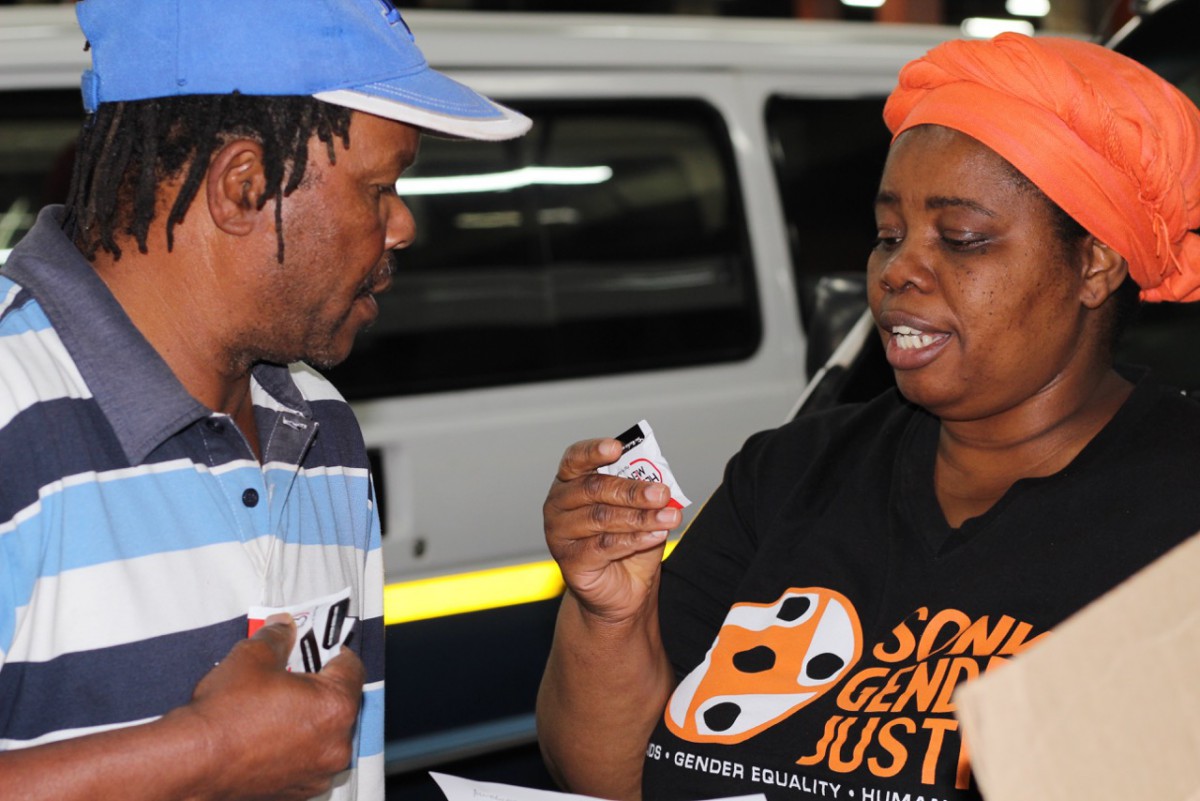The article below appeared on Health-e News, 18 August 2016
By Amy Green
Nonhlanhla Skosana taps on the closed window of the taxi inching past her at the crowded Bree Taxi Rank in Johannesburg. The driver rolls down his window and greets Skosana while she piles pamphlets and condoms into his hands. The conversation ends abruptly by hooting from the taxi behind them.
Skosana waves apologetically as she walks to another taxi parked a few meters away – she and her colleagues want to speak to as many taxi drivers as they can today.
Their aim is to get men involved in preventing the every-day incidents of harassment and gender-based violence in these spaces.

Engaging men to prevent abuse
This is one of the first activities by the Safe Ride campaign, which was launched by Sonke Gender Justice and the South African National Taxi Council (SANTACO) at the taxi rank yesterday.
“We cannot prevent the harassment of women without engaging men. It is critical for taxi drivers to be partners and hold each other accountable,” says Skosana, who works for Sonke.
Over the next year, supported by funding from the Danish embassy, the Safe Ride campaign will host events in all nine provinces with taxi drivers, queue marshals and commuters.
They are also planning three-day-long intensive training sessions for drivers and their assistants on gender-based violence, how to report such incidents and where survivors can go to for help.
Sonke’s Edward Motale, a former taxi driver and owner, says gender-based violence is common in taxis and taxi ranks but few people are willing to speak out.
“Women are abused in taxis – there are so many cases. But to iron out these problems we need to come together.”
Breaking the silence
After a video of a taxi driver harassing a woman started doing the rounds on social media in November last year, the Department of Women issued a statement urging every member of society to act: “Those in the taxi which include three women and two men kept silent as the women was being embarrassed and assaulted… It takes all of us to intervene and correct the violent treatment by men towards women. The eradication of this plague is only possible if all of us do something.”
Motale believes much of the tension arises from an acrimonious relationship commuters have with drivers: “It is not easy to come out in public and say I’m a taxi driver because they have been labelled so badly. We want to close the gap – we only need communication.”
He says drivers themselves have the power to influence other drivers in this male-dominated industry.
Reducing gender-based violence
“If we reach every taxi driver with this message, I believe we will be able to change society.” – Phillip Thaaibosch, SANTACO.
Trine Rask Thygesen, the Ambassador of Denmark to South Africa, says that gender-based violence is a very important global issue and, considering that the South African Police Service reported half a million rapes last year alone, campaigns like this are a necessity.
“This is not going to change South Africa overnight. It is a process. But we’ve seen the dedication of Sonke and SANTACO – there is huge potential in this campaign,” she says.
According to Phillip Taaibosch, SANTACO’s president, there are roughly 680 000 taxi drivers affiliated to his organisation serving more than 15 million commuters across the country every day.
“I was born from a woman and as a husband to a woman, my responsibility is to ensure women are protected. That is the message we want to send to drivers: to understand the importance of respecting women. If we reach every taxi driver with this message, I believe we will be able to change society.” – Health-e News